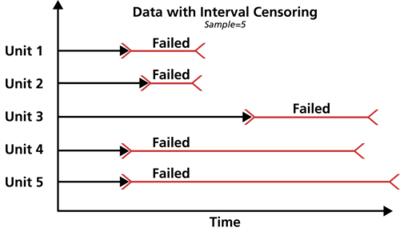Template:Interval Censored: Difference between revisions
Kate Racaza (talk | contribs) No edit summary |
|||
| Line 1: | Line 1: | ||
=====Interval Censored===== | =====Interval Censored Data===== | ||
The second type of censoring is commonly called ''interval censored data''. Interval censored data reflects uncertainty as to the exact times the units failed within an interval. This type of data frequently comes from tests or situations where the objects of interest are not constantly monitored. | The second type of censoring is commonly called ''interval censored data''. Interval censored data reflects uncertainty as to the exact times the units failed within an interval. This type of data frequently comes from tests or situations where the objects of interest are not constantly monitored. For example, if we are running a test on five units and inspecting them every 100 hours, we only know that a unit failed or did not fail between inspections. Specifically, if we inspect a certain unit at 100 hours and find it operating, and then perform another inspection at 200 hours to find that the unit is no longer operating, then the only information we have is that the unit failed at some point in the interval between 100 and 200 hours. This type of censored data is also called ''inspection data'' by some authors. | ||
[[Image:interval censoring.png|center| | [[Image:interval censoring.png|center|400px|]] | ||
Revision as of 10:45, 2 July 2012
Interval Censored Data
The second type of censoring is commonly called interval censored data. Interval censored data reflects uncertainty as to the exact times the units failed within an interval. This type of data frequently comes from tests or situations where the objects of interest are not constantly monitored. For example, if we are running a test on five units and inspecting them every 100 hours, we only know that a unit failed or did not fail between inspections. Specifically, if we inspect a certain unit at 100 hours and find it operating, and then perform another inspection at 200 hours to find that the unit is no longer operating, then the only information we have is that the unit failed at some point in the interval between 100 and 200 hours. This type of censored data is also called inspection data by some authors.
